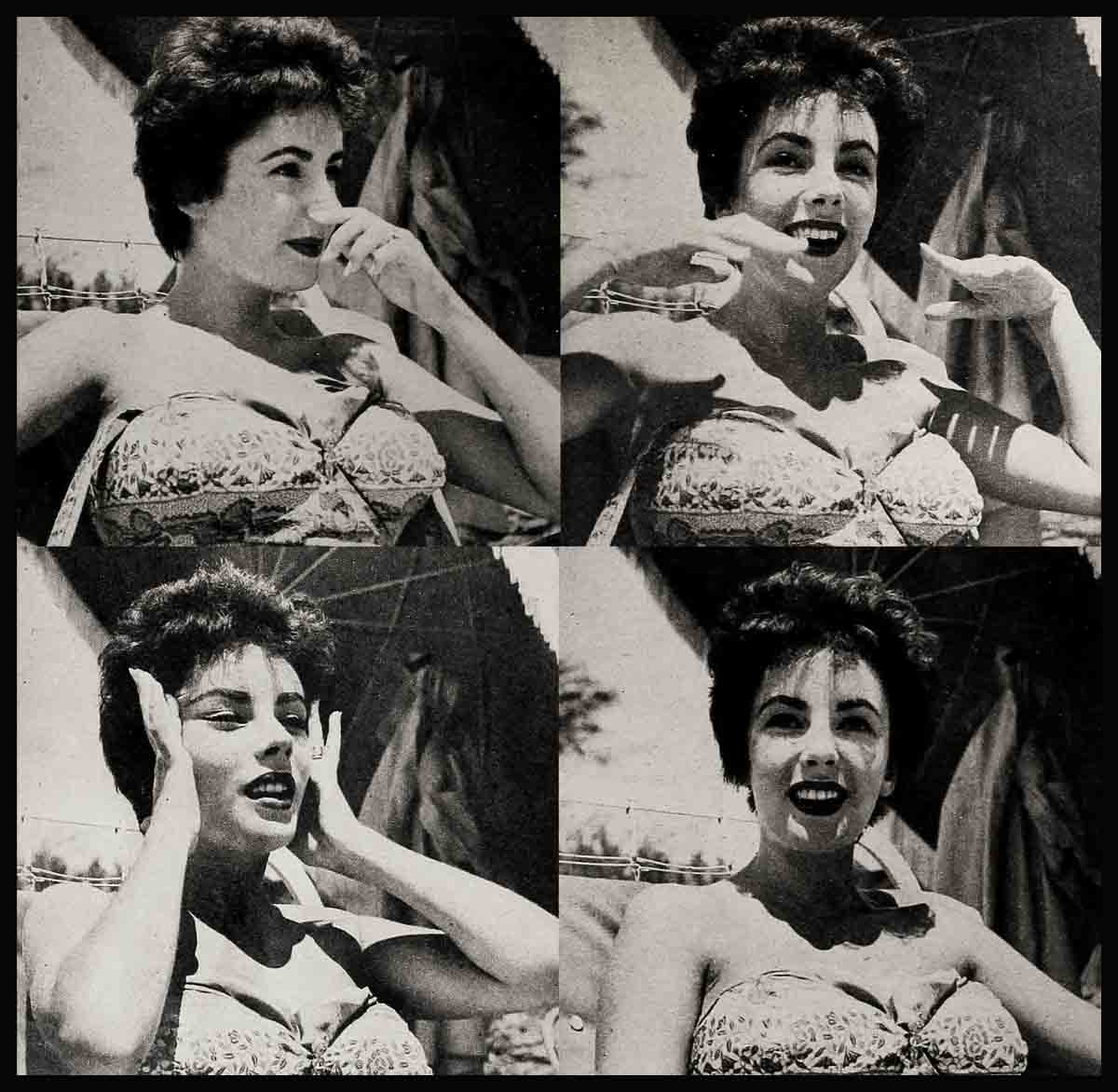
Just What The Doctor Ordered!—Elizabeth Taylor
Marriage has changed Liz Taylor a lot. For one thing, she’s begun to wear shoes at social functions and even at home. Mike Wilding finally put her in them, then took off his own. He opened the door of their eagle’s nest home in Beverly, and looked for all the world like a road show Gary Merrill. He was dressed in unpressed gray slacks, a sports shirt, a tweed coat, and was completely barefoot.
He was unaware that his shoes were missing, and this sent me into gales of laughter. For years I’ve been telling Liz if she didn’t quit paddling around barefoot, she’d end up wearing canal boats or size 12’s. But would she listen? No. Bare feet seemed to symbolize freedom of childhood to Liz, who never really wanted to grow up. In the White House once, she surreptitiously kicked off her shoes, and they landed smack under Bess Truman’s chair.
Now Mike may wear the pants in that family, but he doesn’t wear the shoes. “Come in,” he said twiddling his toes contentedly. “Liz tried to get out of the bath to greet you, but she didn’t quite make it.” (This was at 3:00 P.M.) That wasn’t surprising. Every time I’ve called her since the baby came, Liz had to be rousted out of a bath to answer the phone.
I took a few moments to scan the view. “You seem like an interloper,” I said to Mike. “Charles Mendl and I used to come here every Saturday morning to look at the scenery and walk down the hill.” And what scenery! For miles beneath us Los Angeles sprawled outward to the sea. Marvelous cloud formations drifted overhead. To the north were rows upon rows of rugged mountains, and nestling in their folds rose gardens and orange groves. There was no house there then; only a hilltop covered with wild growth and a view. Charles, who had traveled the world over, used to say it was the most beautiful sight in the universe. Now it belongs to Mike and the most beautiful star-studded mother in Hollywood.
And I might add, it also belonged to one of the most beautiful babies. Yes, Michael Howard was a property owner before he was born. “The man who built the house Save our expected baby an acre and a half of land.”
He pointed out young Michael’s section—an up-ended acre that dropped sheerly into a deep canyon. “I hope the boy never falls out of his property,” I said. “It looks as though he’ll need the legs of a mountain goat or a helicopter to reach it.” Mike shrugged. He’d let the lad figure that one out in the future. Mike was too busy living for the day.
“And wouldn’t you know,” I said, “that you’d cover your yard with diachondra instead of grass.” Diachondra is a small plant that requires no mowing—just the thing for the labor-loathing Wildings.
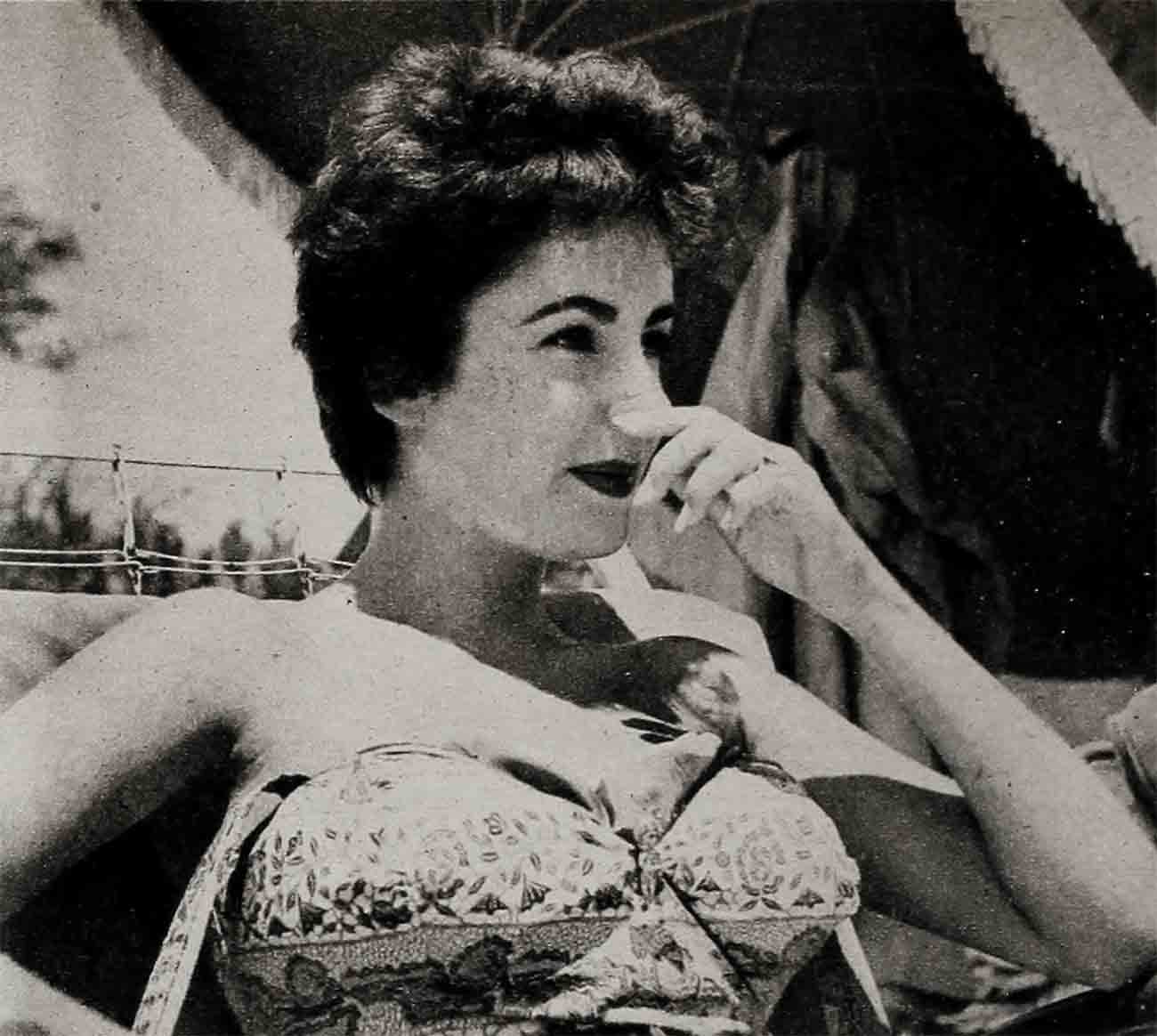
The pool was small, but electrically heated. Mike considers it a great luxury, since swimming pools are rare in his native England. He takes four or five dips a day. Between his swimming and Liz’ bathing, they’re the cleanest couple in town.
“On a clear day,” Mike continued, “we can see Catalina when we sit up in bed. I only hope that Catalina can’t see us.”
That’s hardly likely. The house, a strictly modern affair, has a small yard surrounded by a high fence. It pops into view before a stranger knows he’s near it. The mailbox still bears the name of “Ted McClellan,” the industrialist who built the place. Mike and Liz haven’t yet got around to putting up their shingle.
The yipping of two dogs told me I was at the right place. Those dogs are part of Liz’ eternal menagerie. Come husbands, babies, or what-have you, Liz would feel naked without her animals. If the animals weren’t sufficient identification, an enormous packing box would give you another clue. It rests beside the driveway and bears the inscription: “Made in England” and “Mr. M. Wilding.”
“Well,” I said, “you can certainly look down on many famous people.” On the winding road up the hill you pass the homes of Danny Kaye, Ronald Colman, Katharine Hepburn, Fred Astaire, Mary Pickford, Charlie Chaplin, Constance Bennett, and King Vidor.
“Isn’t that wonderful,” said Mike, ushering me through a small hallway into a huge combination living-dining room. The windows reach from floor to ceiling to take advantage of the view. All the furnishings are as modern as the house.
The color accent of the living room is purple—a blue-violet divan with purple pillows; purple glassware gleaming from various spots; before the rock fireplace a purple chair. It was obvious that somebody’s favorite color was purple, and I soon learned that somebody was Liz. Her bachelor-girl apartment had been dominated by green and chartreuse (which she loathed) and always looked as though somebody had moved in but never got around to settling down.
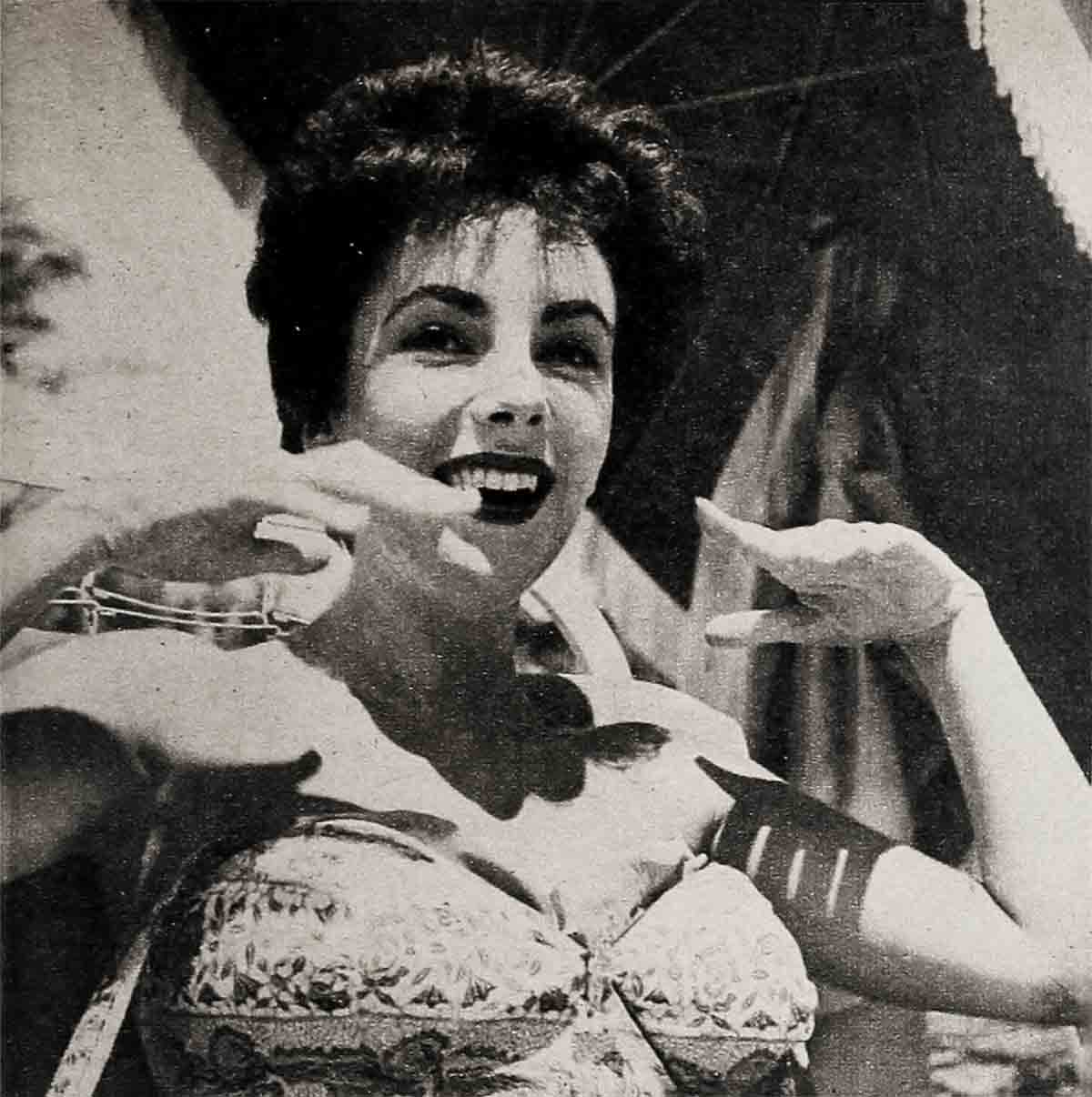
But Mrs. Michael Wilding’s home already has the air of permanency. The walls are covered with paintings. A huge landscape, a wedding gift from her art-dealer father, hangs above the divan. Next to it is an Augustus Johns portrait. Beside the fireplace is a life-size bronze bust of a girl by the noted sculptor Jacob Epstein. Mike confided that he knew the girl who had posed for the statue.
An accent of humor is added to the dining room section by a caricature Jean Negulesco did of Liz when she was expecting the stork. It shows her in black slacks, a full purple smock, and a tousled head of hair. Mike can always point to it and say, “That, my dear, is how you looked in the first year of our marriage.”
Liz’ hair was still touseled when she entered the room. A poodle-cut, without waves, produced a shaggy effect. Her flowing white dressing gown concealed her figure; but her face was no longer oval. It was round. Except for lipstick she wore no make-up, and no jewelry except a plain gold wedding ring on her finger, and a tiny gold cross around her neck. Her eyes were sleepy, and she looked as relaxed as the black cat that lay sleeping on a green upholstered bar stool in a corner of the room. But she was still beautiful.
Making a mock curtsey, I exclaimed, “Why, Liz, you wore that dressing gown a year ago. Shame on you.”
“But ’m much poorer and much older now,” she protested. The wind which had been blowing hard all day now began to howl around the house. At the sound Liz’ eyes were no longer sleepy. They opened wide. “Welcome to Wuthering Heights,” she said. “I’m supposed to go back to work—terrible thought—in three weeks; and I’ve got to lose some weight, but fast.”
“Well, you can’t do it by diet alone,” I said. “I’ve got a wonderful masseur, Dr. Fred Nelson, who could take those extra inches off you.”
“How much does he charge?” was her first question.
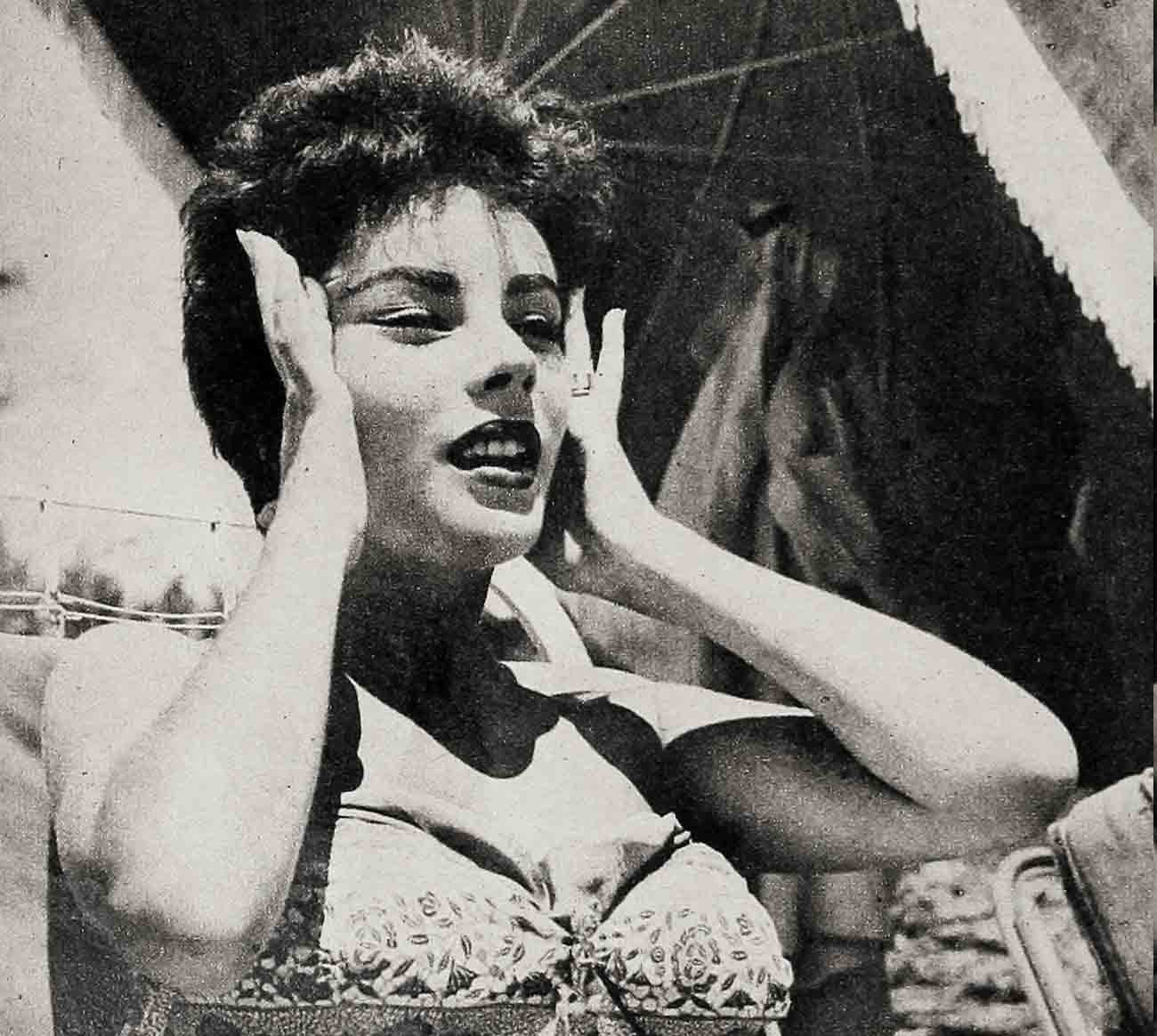
At that, a dead silence fell over the room, and everybody did a double-take. For Liz to ask about the price of anything was like an atheist asking the way to church. Finally Peggy Rutledge (Liz’ secretary) turned to me and said, “Are you sure you’ve come to the right address?”
“We’re very poor,” Liz continued, “and I have to think of prices. We call this ‘Suspension House’.”
“In one year, we’ve had a year and five months of suspensions between us, a record for one family,” explained Mike. “I was on suspension four months; and Liz, seven. Then we both had a three-months layoff. Figure it up. We’ve been suspended so long we feel like bats hanging from the rafters.” In Hollywood language “suspension” means being taken off studio salary for failure to do a picture assigned one, or for having a baby.
“But we’re all set now,” said Liz. “Mike has one picture coming up; and I have two. How much does your masseur charge, seriously?”
“If he charged by the pound . . .” I replied, studying her figure, then stopped with a gasp. I noticed Liz was wearing bedroom slippers. “Well, well,” I roared. “Mike finally got shoes on you and took his off.”
“He got shoes on me!” exclaimed Liz. “When did this happen? I’m always a fashion plate when you’re around, you know.”
“Of course,” said I. “You and Mike must come to a party I’m giving next week.”
“Party,” replied Liz in a shocked voice. “I haven’t a thing to wear. All my old clothes are too small. And I’ll be darned if I’m going to buy anything until I’ve reduced.”
“The party’s being given for Dana Tasker, the man who got your pretty puss on the cover of Time. He wants to meet you,” I said.
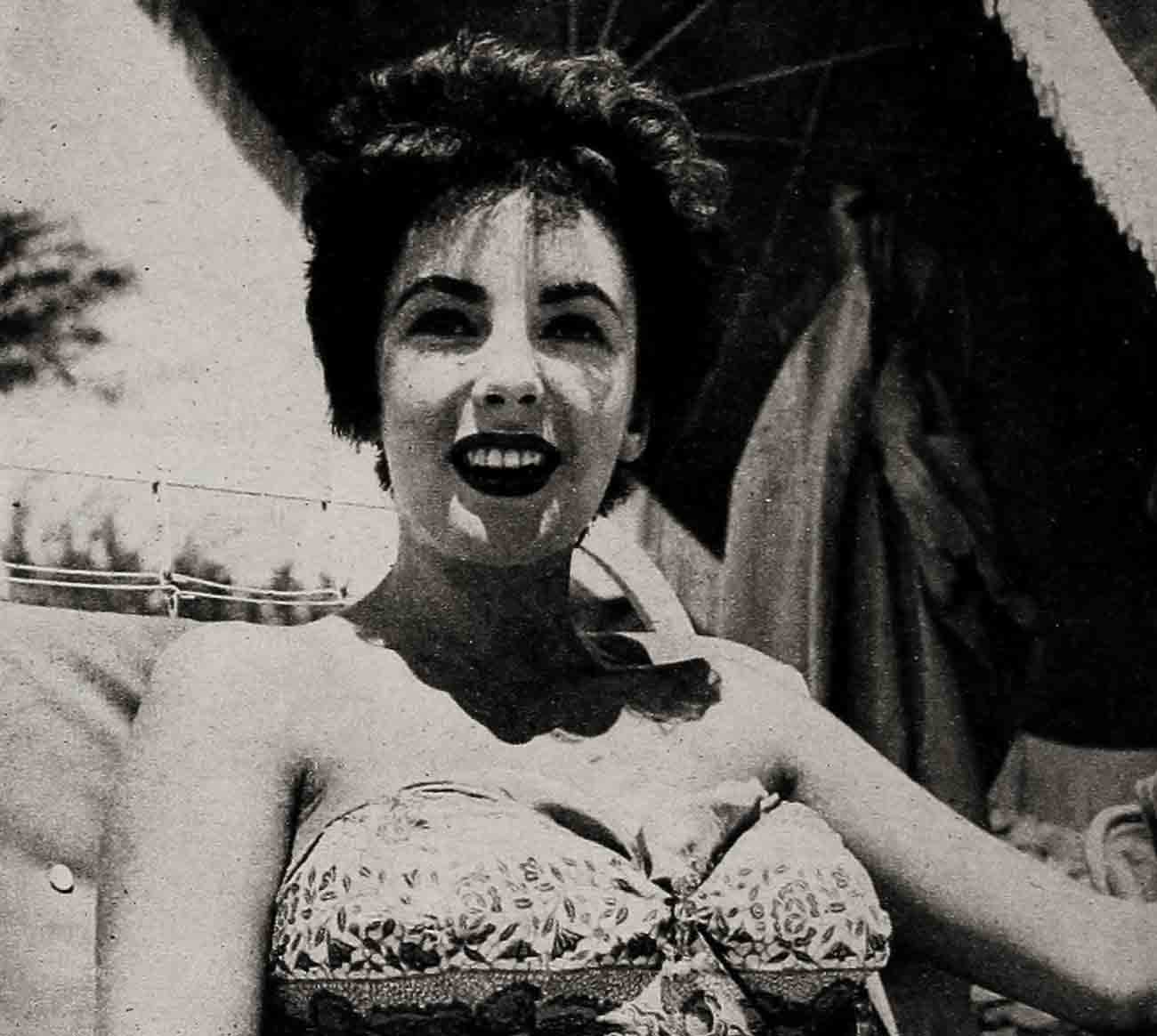
“Maybe he’d buy me a new dress,” Liz hinted.
“Maybe he would, but I doubt it,” I said. “Perhaps I could promote you a free massage upstairs while the party’s going on below.”
“You’re a real little sport,” said Liz with a smile.
“She’s a very difficult girl to handle,” said Mike. “The reason she put on so much weight is that she drank and ate everything in sight, especially milk, during her pregnancy. The doctor told her to slow down on that milk consumption, that she was gaining too much weight. But she just batted those baby blue eyes at him and said, ‘But I like milk.’ Naturally the doctor couldn’t resist her. He said, ‘Well, have milk then. Have it.’ She put on 40 pounds.”
“Forty pounds!” I yelled.
“But I’ve already lost 25,” she said. Then added kiddingly, “You see I owed it to myself to remain strong and healthy. The baby would have got enough food from me, no matter how much I weighed. All that calcium in the milk was good for him.”
As Liz told this grandmother all about what you must go through to have a fat, healthy baby, Mike sat in the purple chair and beamed at her. They seem to appreciate each other’s sense of humor. When Liz scored a wisecrack, Mike smiled like the cat that swallowed the canary. But since the topic Baby had been brought up, he asked, “Don’t you want to see him, Hedda?”
“Sure,” I said. “That’s why I’m here.”
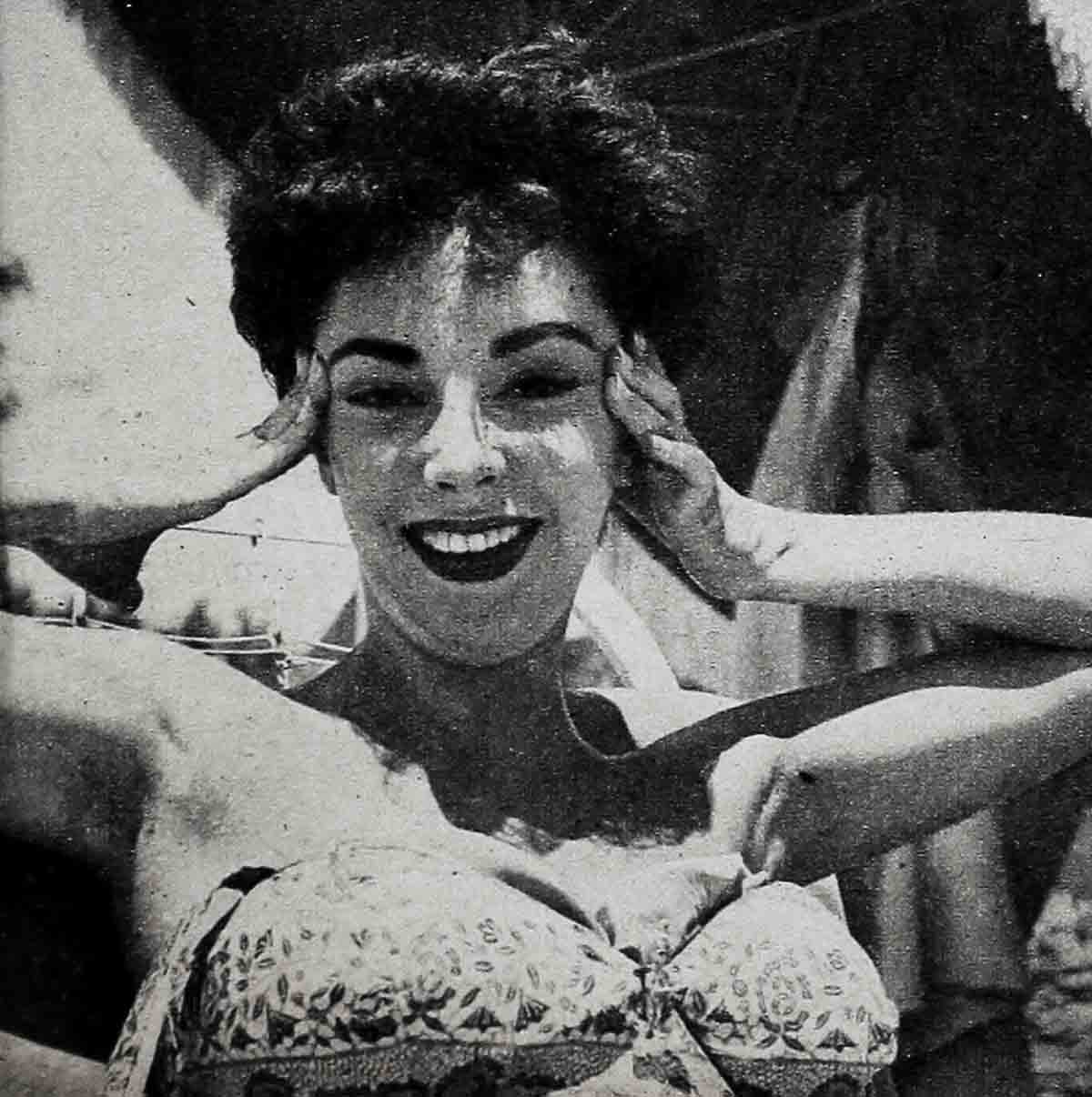
The statement brought pandemonium. Mike jumped up and started for the nursery. Liz was immediately on her feet and after him. By the time I got into locomotion, a small poodle, by the name of “G”, joined the party, barking and getting under everyone’s feet in an effort to get to the nursery first. But the black cat on the bar stool never opened an eye or moved. It would take more than a baby to wake him up.
The baby’s room is painted in yellow and pale blue. Toys are all over the place. On a ledge around the room sit all kinds of stuffed animals: Bears, deer, dogs, and eats. Toy soldiers stand at attention on top of a chest of drawers. Also in the room were a tiny blue chair, a bed for the nurse, a large canopied child’s bed, a bassinet with yellow organdy ruffles and a pure white blanket with “Michael” embroidered on it in pink, and a small basket which holds the baby when he travels to and from the doctor’s office. But tiny Michael Howard was oblivious to all-these comforts of home. He was sleeping soundly on his stomach in a small, plain perambulator. A pink blanket hid all but his head, which was covered with dark, black hair, like Liz’. He has a turned up nose and tiny ears that lie flat against his head.
“And he has blue eyes,” said Mike, pulling back the blanket so I could see all of his son. “And see how long he is.” He was as proud as a mother hen with just one chick over his son and heir.
“Has he shown any special talent?” I asked.
“Certainly,” said Mike. “He knows when to stop feeding. Unlike most babies who over-eat then up-chuck, our boy stops, pee a while, then goes back to his food.”
On the walls I spotted a picture of Liz, and asked, “Now who ever did that? It’s a horror.”
“It’s Michael’s first attempt at painting. He did it from a photograph when he had to return to London, and I had to stay in Hollywood to finish a picture,” said Liz.
“Don’t shoot, Hedda, I’d never do another one,” Mike added.
“I did the other picture with the snow and two deer when I was 12,” said Liz.

“Now for the bedroom,” I said.
Liz led the way. I nearly had a stroke when I saw the size of the bed. “It’s only seven feet by seven and a half,” said Liz. “I wanted one nine by nine.”
“She didn’t know her bed or sheet sizes,” Mike broke in. “This one is great.”
“Somewhat like a battle ground,” said I.
“Sure,” said Liz, “it gives you room to kick around and do all sorts of things without disturbing one another.”
The room was definitely pink, with a huge television set facing the bed, and a chaise longue beside it. There was another TV set at the bar. “You must be nertz about television,” I suggested.
“A family arrangement,” Mike explained. “Liz loves murder mysteries, and I like boxing. With two sets there’s no conflict.”
The bedroom was immaculate, and I commented on it. “But don’t look in the bathroom,” pleaded Liz.
“Tell me, Mike. Is she still careless about hanging up her clothes?” I asked. “She used to leave them wherever they fell.
“I told you not to look in the bathroom,” giggled Liz.
“Well,” said Mike, “she has fewer clothes to drop now. But thank goodness, she doesn’t drop the baby. As a matter of fact, she’s a good mother. I’m proud of her.”
“I don’t see what that has to do with motherhood,” pouted Liz. “I know a lot of old people who leave their clothes all over the place. My husband, for instance. But, Hedda, don’t you think the bedroom does look neat?”
“Yes,” I replied, “but I’ll bet my hat you cleaned it up when you learned I was coming up to see you.”
“You’re quite right,” Mike admitted. “Things were dripping all over the place until I suggested it be tidied up before you got here. I had an idea you’d like to see the bedroom.”
“You were quite right about that too,” said I.
“It’s a model of neatness,” declared Liz.
When we arrived back in the living room, Peggy brought out the other baby of the family—a tiny black poodle named Mugwumps. The poodle and its mother began cavorting all over the place. Coffee arrived. Liz picked up the silver pot, acting as though it were so heavy she couldn’t hold it. “For heaven’s sake! Put it down. You’ll scald us all,” I cried.
“It’s so heavy,” signed Liz, collapsing on the sofa and stretching herself. I’ll take a nap. I just got up before you came. I hadn’t been out of bed all day.”
“You get up at three in the afternoon?”
“Well, I’d been awake for quite a few hours,” she explained. “The doctor told me I must sort of take a nap.”
“She must sort of take a nap; so she sleeps all day,” I said. “She’s really playing her role to the hilt. Mike, I’m afraid you’ve got yourself a real lazy girl.”
“It’s all right,” he said, tossing a smile at his wife. “I’m sort of lazy too.”
Liz just lay there, looking utterly helpless. And I could just see everybody in house breaking their necks to cater to her slightest whim. She was living it up and liking it.
“Now, my girl, tell me how it feels to be a mother,” I said, knowing I’d laid myself open with that one.
“I like it,” said Liz in imitation of Jerry Lewis. “I hope you didn’t expect anything more intelligent in the way of an answer.” Then she sat up and had herself a cup of coffee, resting the cup on a purple pillow in her lap. “No, really,” she added, “he’s a very good baby—cries only when he’s hungry, and gets hungry only on schedule. But he’s so tiny and delicate, I do worry when I have to flip him over in the crib.”
“Do you bathe him?” I wanted to know.
“No. But Mike helps,” she said.
“I was up at the crack of dawn this morning,” he said. “The nurse did the bathing though. I stood by watching and looking like a fool.” He got up, slipped into the nursery, and came back with a puzzled expression. “He’s sleeping with his eyes open,” he said. “He’s got one eye open and the other shut.”
“He’s not asleep, love,” said Liz. “Michael gets upset so easily,” she explained. “Bless his heart. The night the baby was born, the doctor told him the operation would take about 12 minutes and promised to let him know whether he had a boy or girl as soon as the Caesarean was over. But somebody forgot; and Mike had to wait 45 minutes.”
“I was climbing the walls by the time I got the news,” said Mike.
“When he was finally taken to see the baby, Mike thought it was like an opening night,” continued Liz. “A curtain was raised, and he spotted a nurse standing behind the glass with her mask on. The baby had one eye open and the other closed then. Mike cried, ‘Oh, my God, he has only one eye.’ Then he started making frantic signs and yelling to the nurse, ‘What’s wrong with the other eye?’ She leaned over and gently pried the eye open.”
The poodle yipped at the puppy under Liz’ feet. She jumped, “Please. My nerves.”
“What did you think of the baby when you first saw him?” I asked.
“I’d had a spinal block, but was awake when he was born,” said she. “He was five seconds old when I first saw him. The doctor was holding him by his feet; and the baby was bright purple—my favorite color.”
“That children survive at all is wonderful,” said Mike. “After one breath, the doctor holds them up by one leg to drain the mucus from the lungs. The baby just dangles there, chokes, and becomes purple.”
“What a colorful description for a father to make!” laughed Liz. Then she turned serious. “An hour after Michael was born, he was brought to me; and I saw that he was beautiful. He was all pink and white, with no wrinkles in his skin, and a beautifully shaped head. He opened his eyes when I reached for him. He was beautiful. I couldn’t be making all this up.”
“Did you get an attack of those ‘baby blues’ that many mothers have after giving birth to their children?” I asked.
“No,” she replied. “I was very happy. But I was nervous, without being afraid, before his birth. I didn’t have time to think much of the operation, because I was told it would be necessary only a day before it happened. But it has taken me longer to recuperate than I thought it would. I figured I’d be jumping from room to room in a week. But it’s taken me a month already, and time’s a-wastin’. You know I’ll be 21 the end of this month. Then I’ll be a woman!”
“Okay,” I said, remembering how sensitive Liz was about her youth. “When are you going to have your next baby?”
“In 18 months or so,” she said. “I want my children to be born close together. I guess,” she added with a laugh, “I’ll have to arrange to have them during my suspensions.”
“That’s an idea,” said Mike. “Check with the accounting department at the studio and find out when you can have your next child.”
“Work!” she sighed. “Reducing! No fooling, how much does that masseur charge?”
“Stand up and pull in your stomach,” I said. “I want to see how your figure really does look.”
She did as I requested, murmuring, “Sylph-like, that’s me.”
What I saw made me scream, “Elizabeth! How could you?”
“Just call me Temptress Taylor,” said she.
“You’d better start getting that off quickly,” I advised, and then told her how much per hour my favorite masseur charg.
“What do you think, love?” she asked Mike.
“It sounds interesting,” he replied.
“You’ve got an appointment with your doctor in about 15 minutes,” Peggy Rutledge told Liz.
“So I have,” said she. “This is Thursday, isn’t it?”
We all agreed it was.
During the whole proceedings, Mike was content to leave the spotlight on Elizabeth. He just sat there in his purple chair, grinning at her feminine shenanigans. But when Liz retired to dress, he went to the bar and mixed himself a gin and tonic, explaining that the limes he used were “homegrown”.
How languid Liz dressed so quickly, I wouldn’t know. But before Mike had time to take a sip of his “tonic,” she was back, wearing black velvet slacks with bejeweled shoes to match and a huge white sweater with a turtle neck to which was fastened two gold safety pins. She sat down by Mike and reached for his drink. He shrugged and handed it over, muttering, “Just what the doctor ordered. Reducing stuff.” (She sipped a third of the contents before handing it back.)
“Well, my dear,” said I, “it’s just as the girl claims. She has to keep up her strength, you know.”
I glanced at the black cat still slumbering on the bar stool, and it occurred to me that the cat sets the pace for the Wildings’ household. I had a feeling that in a way they envied him. After all, he didn’t have to work; he slept the hours away; and when he wanted food, he got it and never had to worry about what it did to his figure. Yes, sir, a cat can look at a queen, but a movie queen can also envy a cat.
THE END
—BY HEDDA HOPPER
(Liz can be seen in MGM’s The Girl Who Had Everything. Michael’s latest picture is The Scarlet Coat.)
It is a quote. MODERN SCREEN MAGAZINE MAY 1953





No Comments